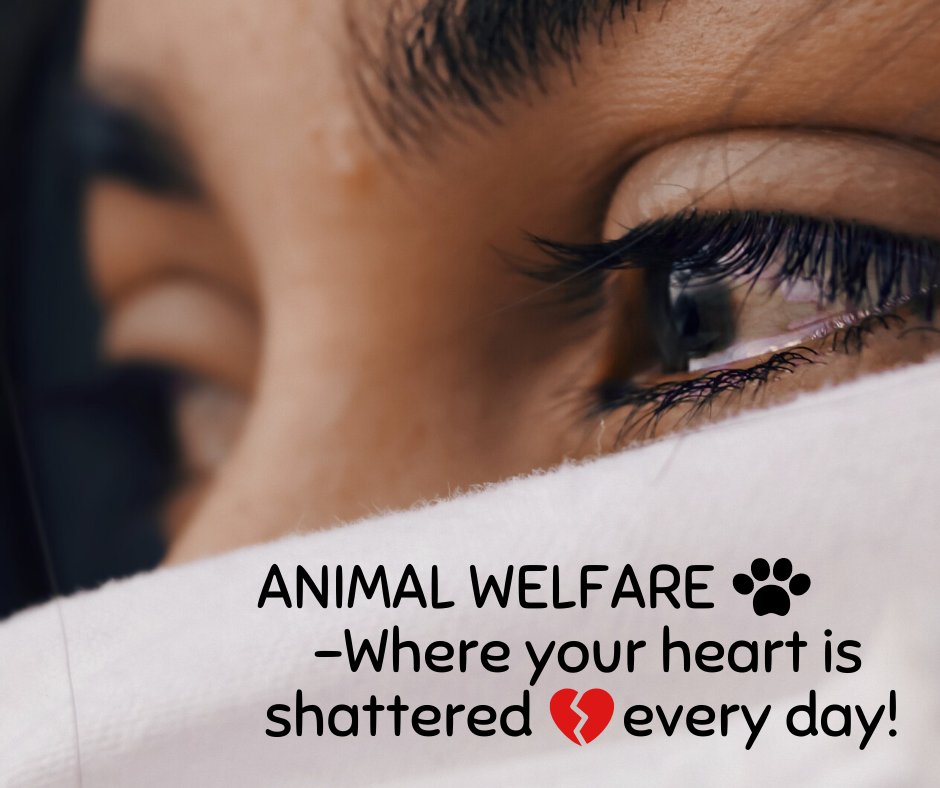
WHAT SORT OF PEOPLE GET INVOLVED IN ANIMAL WELFARE AND CAN YOU SPOT THEM?
Within the intricate tapestry of animal welfare, there is a diverse array of personalities, each with its own motivations and behaviours. This happens in other industries too, but today I will focus on the animal welfare industry. This article delves into the complexities of these personalities, shedding light on their impact on the animal welfare community, but keep in mind that I am touching only on the basics here.
I have been involved in animal welfare for a few years and I work with organizations in and outside of South Africa. Sadly, no matter the geographics, politics rears its head in every industry. I believe the type of person and motivation is part of the cause of the conflict within animal welfare.

AN EMOTIONAL INDUSTRY
First, you have to understand that for the most part, the animal welfare industry is emotionally driven. Coupled with low emotional intelligence, this combination can lead to a toxic environment characterized by infighting (there is sadly a lot of it), disharmony, and the lack of objective decision-making. This does damage to the whole industry and the public’s perception.
Individuals lacking confidence often manifest their insecurities through defensive behaviours and interpersonal conflicts. Instead of fostering collaboration for the greater good of animal welfare, these individuals may engage in power struggles, criticism, lies and blame, further exacerbating tensions within the community.
In animal welfare you will also experience and deal with a rollercoaster of emotions in just one situation for example when we hear about a dog in the streets, we can and do experience multiple emotions at once; anger because the dog is in the streets, worry about the dog’s life, frustration with a society that doesn’t care to keep their animals in the yard or expects someone else to do something, and sadness from previous cases which didn’t turn out so good. We worry about a dog that is not even ours and often feel guilty if we can’t change the situation or help.
Keep in mind, for the most part, females are involved in this industry, which ads another layer of complexity, and we do need more strong men onboard too!
MOTIVATION
At the core of animal welfare lie two distinct motivations: the solution-driven and the self-seeking. The former group is propelled by a genuine desire to effect change, while the latter seeks personal validation. This nuanced distinction underscores the multifaceted nature of advocacy within animal welfare.
The motivations for individuals to join the ranks of animal welfare are as diverse as the animals they seek to protect. For some, it’s a deep-seated empathy and compassion towards animals, driving a desire to alleviate their suffering and advocate for their rights. Others are motivated by a sense of duty and responsibility, viewing their work in animal welfare as a moral imperative. Some are drawn to the intellectual challenge of finding innovative solutions to complex problems, while others find fulfillment in the opportunity to make a tangible difference in the lives of animals.
Regardless of the specific motivation, what unites (well supposed to unite) individuals in animal welfare is a shared commitment to creating a more compassionate and just world for all living beings. Collaboration is essential within the animal welfare community because none of us can “do it all”. Despite differences in motivations and personalities, collective action is essential for achieving meaningful change. Encouraging collaboration fosters synergy and amplifies the impact of advocacy efforts.

PERSONALITY PROFILES
Let’s look at some of the basic personalities in animal welfare!
The Altruistic Problem-Solver
These individuals embody the essence of solution-driven activism. Fuelled by empathy and compassion, they tirelessly advocate for animal rights and welfare, seeking tangible solutions to complex issues. Their dedication to their cause is unwavering, making them invaluable assets to the animal welfare community. This group is usually people who are secure in themselves and believe in their abilities. They are self-motivated and when you have conversations with them, it is different from the next ones.
The Self-Seeking Benefactor
In contrast, the self-seeking benefactors are motivated by personal validation. While they may genuinely care for animals, their primary drive stems from a desire for self-enhancement rather than altruism (selfless concern for others). These are usually the conflict creators and you can see it in the relationships within the community.
I had a discussion with one organization’s chair and when I said we need solutions so we can totally stop the problem, she basically said: “but then we won’t be needed”. They are also the ones who think what they do is more important than others and try to drag down those they see as a “threat” or who can expose them.
They want to matter and they want to feel better about themselves. Helping animals create that feeling for them. Their advocacy efforts may yield positive outcomes, but questions linger regarding the authenticity of their motives. Unfortunately, because of the industry they are in, no one can “fault” them for doing something that can be considered noble. This is often a reason why they get involved. You can’t say anything bad to someone who seem to help animals, right? It would make you the villian.
The Caring Yet Ineffective
A significant portion of individuals in animal welfare genuinely care, but lack the necessary skills to effect meaningful change. This group often struggles with business insight, decision making, planning, seeing the bigger picture, conflict resolution, finding solutions, emotional intelligence and more. Despite their good intentions, their effectiveness is hindered by a lack of essential skills and resources. These people have the heart, but few are teachable, by choice.
It is not only important to educate the public but to also foster a culture of continuous learning and growth within the animal welfare community. Encouraging individuals to seek out opportunities for professional development, skill-building, and knowledge-sharing can enhance effectiveness and innovation in advocacy efforts. By staying informed about emerging trends, best practices, and evolving challenges in animal welfare, individuals can adapt and evolve their approaches to better serve the needs of animals. This commitment to ongoing improvement not only strengthens the capabilities of individuals and organizations but also reinforces the collective commitment to the welfare of animals.
THE SYMPATHETIC, EMPATHETIC, AND NARCISSISTIC
You can also separate people in animal welfare into these three categories. In the realm of animal welfare, both sympathetic individuals and empathetic souls play vital roles in advocating for the well-being of animals. Sympathetic individuals demonstrate compassion and concern for animals in need, often driven by a desire to alleviate suffering and offer assistance. Their willingness to extend kindness and support can provide comfort to animals and contribute to their welfare.
On the other hand, empathetic individuals possess a deeper understanding of animals’ emotions and experiences, allowing them to connect on a more profound level. Empathy enables individuals to not only recognize animals’ needs but also to actively engage in solutions that address their well-being. Both sympathy and empathy are invaluable qualities within the animal welfare community, working in tandem to create a more compassionate and caring environment for animals in need.
In the animal welfare community, believe it or not, there are many narcissists too. They fool most of the public by pretending to care. The public genuinely believes they do care when they don’t. Communal narcissists may outwardly appear caring, often positioning themselves as pillars of their communities or advocating for social causes. These individuals prioritize self-promotion over genuine activism and care, using their involvement in animal welfare as a means of gathering attention and admiration. Their inflated egos can and have disrupted collaborative efforts and hindered progress within the community.

NAVIGATING THE COMPLEXITIES
To navigate the complexities of personalities within animal welfare, a culture of empathy, collaboration, and accountability must be fostered. Recognizing the prevalence of individuals lacking essential skills, efforts should be directed towards providing training and support. By empowering individuals with the tools and knowledge needed for effective advocacy, the animal welfare community can overcome the leadership crisis the industry and world face and work towards meaningful change.
UNDERSTANDING THE NEED FOR DIFFERENT ROLES
The animal welfare industry tends to attract individuals with a strong sense of compassion, empathy, and advocacy, as discussed. These are people who are, for the most part, deeply committed to the well-being and protection of animals, often driven by a desire to alleviate suffering and promote positive change. Within this industry, there is a diverse range of personalities, each contributing unique strengths and perspectives to the cause.
There are nurturing and empathetic individuals who excel in animal care roles, providing love, attention, and medical treatment to animals in need. Advocates and activists are passionate about raising awareness, campaigning for policy changes, and fighting against animal cruelty. Researchers and scientists bring their analytical minds to uncover insights that improve animal welfare practices. Administrators and organizers ensure the smooth running of shelters, rescue organizations, and advocacy groups. Overall, the animal welfare industry attracts individuals who are dedicated, resilient, and deeply compassionate, who should be united by their shared commitment to making the world a better place for animals.
Indeed, the tireless efforts of those in the trenches of animal welfare deserve admiration and respect. However, the broader landscape of animal welfare encompasses diverse roles and contributions, each playing a crucial part in advancing the cause. Diminishing the efforts of others because they differ from one’s own is not only unjust but also counterproductive. Such behaviour often stems from deep-seated insecurities, as secure and confident individuals recognize the value of all contributions. Legal experts, legislators, visionaries, accountants, fundraisers, and various other professionals play indispensable roles in addressing the multifaceted challenges of animal welfare, not necessarily working directly with the animals all the time.
Navigating the complexities of animal welfare often leads us to confront the realities of the roles within it, including the critical role of animal welfare inspectors for example. It’s a challenging position, one that requires a unique blend of empathy, confidence, high emotional intelligence, insight and objectivity, willingness to learn and grow, adaptability, good decision-making skills, problem-solving skills, and a deep commitment to the welfare of animals. Yet, in unregulated systems with a huge shortage, the selection of individuals for such roles may not always prioritize these essential qualities.
In some instances, individuals may find themselves in inspector roles by circumstance rather than by choice, perhaps transitioning from other positions within an organization like an administrator to a field officer and then inspector. While their intentions to help may be genuine, the absence of a passion-and-skilled-driven pursuit of the role can impact their effectiveness.
Moreover, in my opinion, and likely not a popular view, the more ambitious inspectors may leverage such positions as stepping stones to higher authority, potentially exacerbating the leadership vacuum within statutory bodies. Thus, ensuring that the right individuals are chosen for these critical roles and providing adequate support and training is imperative for advancing the cause of animal welfare effectively.

WE NEED STRONGER LEADERS
We are facing a leadership crisis everywhere, but especially in animal welfare. I am passionate about leadership training and the lack of true leaders (not popular ones) is immense. Leadership, as in any industry, is also important in animal welfare for several reasons. Firstly, effective leadership provides direction and guidance, ensuring that efforts are coordinated and aligned towards achieving common goals. Secondly, strong leadership fosters innovation and strategic thinking, enabling the development of sustainable solutions to complex challenges within the field. Additionally, leadership sets the tone for organizational culture, promoting values such as empathy, collaboration, and accountability and proper conflict resolution.
The presence of diverse personalities within animal welfare exacerbates existing leadership challenges. Ultimately, strong leadership is essential in navigating these diverse personalities, driving positive change, inspiring others, and advocating effectively for the welfare of animals. We do need stronger leaders in the industry and we also need business people to run or assist animal welfare organizations on an operational level. If you are leading a team, you need to know your team’s personalities, train your team, and take care of your team.
Also, read more about animal adoption.
WE NEED ACCOUNTABILITY
Those who can’t communicate properly will think everything is an argument and those who lack accountability will think everything is an attack. True advocacy for animals demands a higher standard of conduct. Holding each other accountable and striving for continuous improvement, both personally and organizationally, are essential principles. By prioritizing the welfare of animals above personal insecurities and ego-driven conflicts, individuals can transcend their limitations and cultivate a culture of mutual respect, cooperation, and effectiveness within the animal welfare community.
In conclusion, embracing diversity of skills and perspectives fosters a more comprehensive an innovative approach to advocacy, ultimately benefiting the animals we all seek to protect. We must uphold each other to high standards of collaboration, accountability, and mutual respect, recognizing that our collective efforts are far more impactful than any individual endeavour. We have to recognize and promote diversity and inclusion in the animal welfare industry. By amplifying marginalized voices and perspectives we can do better for the animals.
Each personality profile brings its own set of challenges and opportunities. By fostering a culture collaboration, the animal welfare community can harness the collective strengths of its members to enact meaningful change for animals in need. I hope and work for a day when we won’t have to rescue animals anymore, but until then, we all need to work together, if it is really about the animals.
Next week we will look at whether you are informed about a few important topics, when it comes to caring for your pets.
WHEN YOU KNOW BETTER, DO BETTER!